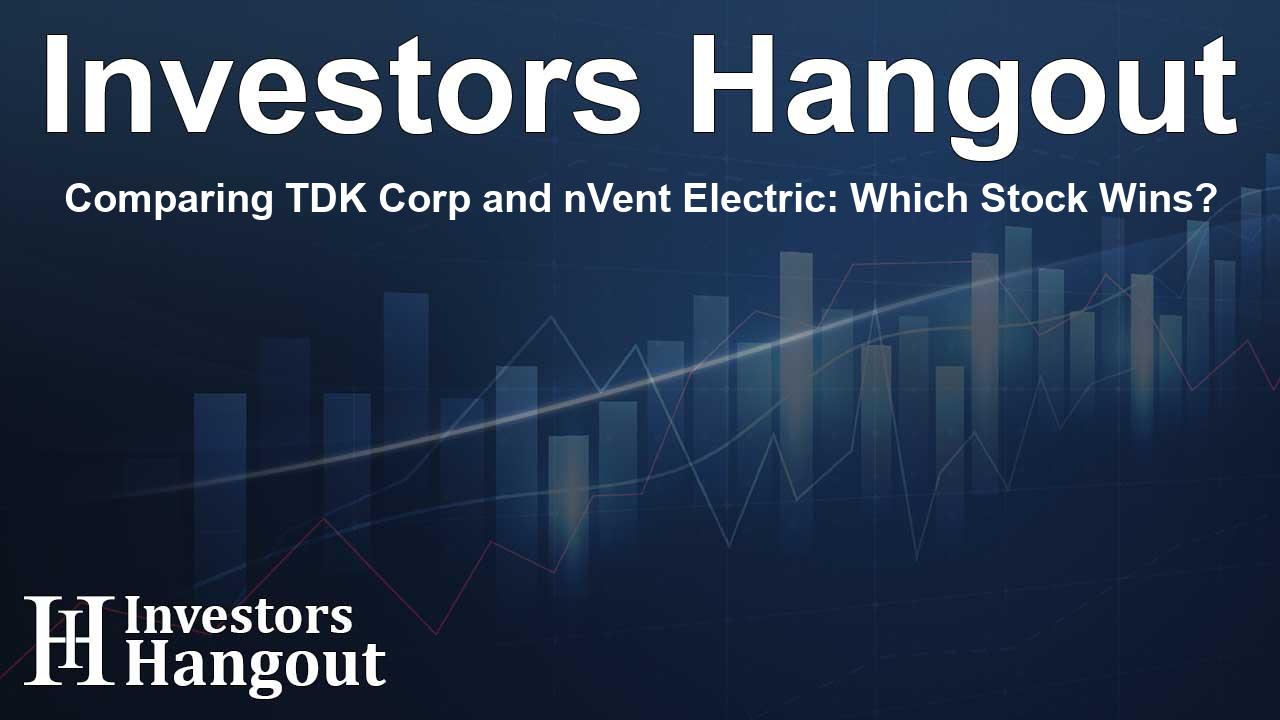Comparing TDK Corp and nVent Electric: Which Stock Wins?

TDK Corp vs. nVent Electric: Which Looks Like Better Value?
If you’re scanning the Electronics - Miscellaneous Components corner of the market, two names keep showing up: TDK Corp and nVent Electric. With TDK Corp trading under TTDKY and nVent Electric under NVT, the natural question is simple: which stock offers better value right now? Let’s walk through the key numbers and see what they say.
Value Investing, in Plain Terms
Value investing means hunting for stocks that look cheaper than they should, based on the business they represent. You’re not chasing stories—you’re checking the math. Common checkpoints include the price-to-earnings (P/E) ratio, the price-to-book (P/B) ratio, and the PEG ratio, among others. Each one tells you something different about what you’re paying and what you might get in return.
A quick refresher: the P/E ratio compares a company’s share price to its earnings; the forward version looks ahead using projected earnings. The P/B ratio lines up the share price against the company’s book value, a balance-sheet view of net assets. The PEG ratio takes the P/E and adjusts it for expected earnings growth, helping you weigh price against growth potential. Lower numbers often point to better value—provided the business can actually deliver.
Current Rankings
On momentum tied to earnings estimates, the Zacks Rank offers a tidy snapshot. Right now, TDK Corp carries a Zacks Rank of 1, or “Strong Buy.” nVent Electric sits at a Zacks Rank of 3, or “Hold.” That gap matters: it signals that analysts’ earnings outlook for TDK is currently more constructive, which tends to support near-term performance. If you care about where revisions are headed—and value investors usually do—TDK has the edge.
Key Valuation Metrics
Two quick reads on valuation are the forward P/E and the PEG ratio. TDK Corp’s forward P/E is 16.19, while nVent Electric’s is 19.01. All else equal, paying a lower multiple for future earnings can improve your margin of safety. The PEG ratio fills in another blank: TDK’s sits at 0.58, whereas NVT’s is 1.19. A PEG below 1 often suggests the stock’s price isn’t fully reflecting its expected growth, while a higher PEG can signal you’re paying up for that growth. On both fronts—price versus earnings and price versus growth—TDK looks more appealing.
Price-to-Book Ratios
The P/B ratio adds a balance-sheet lens. TDK’s P/B is 2.20; nVent Electric’s is 3.14. A lower P/B can indicate you’re buying more assets for each dollar invested, which can be attractive if the assets are productive and the business is steady. Here again, TDK screens as the better value on a straightforward comparison.
Bottom Line
Stack the factors—Zacks Rank, forward P/E, PEG, and P/B—and the picture is consistent. TDK Corp stands out today as the stronger value play compared with nVent Electric. The earnings outlook leans in TDK’s favor, and the valuation work backs it up. As always, numbers can move, but on the measures value investors watch most, TDK looks like the better bet right now.
Frequently Asked Questions
What does TDK Corp do?
TDK Corp is a leading electronics company focused on electronic components and materials, the building blocks used across a wide range of devices and systems.
What ticker symbol represents nVent Electric?
nVent Electric trades under the ticker symbol NVT, while TDK Corp trades under TTDKY.
Why does the Zacks Rank matter here?
The Zacks Rank reflects trends in earnings estimate revisions and the related analyst outlook. A Rank of 1 (“Strong Buy”) indicates more favorable revisions than a Rank of 3 (“Hold”), which can be a useful guide for timing.
How does the PEG ratio help with valuation?
The PEG ratio takes the P/E and adjusts it for expected earnings growth, letting you compare price against growth potential. Lower PEG values often point to better value, assuming the growth shows up.
Is TDK Corp a recommended investment right now?
Based on the figures here—its Zacks Rank of 1 and its more attractive forward P/E, PEG, and P/B ratios—TDK Corp is viewed as a “Strong Buy” for value-focused investors at this time.
About The Author
Contact Addison Perry privately here. Or send an email with ATTN: Addison Perry as the subject to contact@investorshangout.com.
About Investors Hangout
Investors Hangout is a leading online stock forum for financial discussion and learning, offering a wide range of free tools and resources. It draws in traders of all levels, who exchange market knowledge, investigate trading tactics, and keep an eye on industry developments in real time. Featuring financial articles, stock message boards, quotes, charts, company profiles, and live news updates. Through cooperative learning and a wealth of informational resources, it helps users from novices creating their first portfolios to experts honing their techniques. Join Investors Hangout today: https://investorshangout.com/
The content of this article is based on factual, publicly available information and does not represent legal, financial, or investment advice. Investors Hangout does not offer financial advice, and the author is not a licensed financial advisor. Consult a qualified advisor before making any financial or investment decisions based on this article. This article should not be considered advice to purchase, sell, or hold any securities or other investments. If any of the material provided here is inaccurate, please contact us for corrections.
